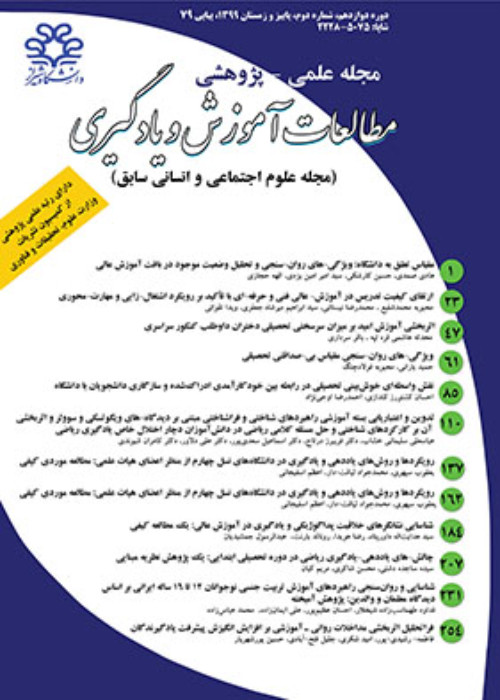Improving Preschoolers' Theory of Mind and Emotional Knowledge: Adaptation and Effectiveness of Mothers' Mediation Training Protocol based on DIR Approach
The ability to understand oneself and others in social interactions, or social cognition, has been a significant topic that has received much attention in recent years in psychology. Theory of mind and emotional knowledge are among the fundamental skills of social cognition. Theory of mind refers to an individual's ability to understand and attribute mental states to oneself and others. Research has emphasized the role of children's interactions with family members and maternal interactive characteristics in promoting theory of mind. Another important ability in social cognition is emotional knowledge, which describes children's adaptive use of emotional information. Emotional knowledge refers to the ability to recognize one's own and others' emotional states, as well as identify emotional situations. Research has shown the impact of parenting style, parental reactions to children's emotions, and emotional conversations within the family on the development of children's emotional knowledge. Overall, theoretical foundations and research demonstrate the influence of parental-child interactions on the development of children's theory of mind and emotional knowledge, emphasizing the concept of mediational interactions, which is central to Feuerstein's theory. Parental awareness of the importance of their interactions and shifting their perspective from passive interaction with the child to a mediational relationship can only be achieved through parental education. Research has shown that parental education improves the quality of their mediation in everyday interactions with their child and enhances children's cognitive abilities. The mother-mediated intervention package based on the integrated human development approach is a group-based parenting program for mothers that enhances the skills (theory of mind and emotional knowledge) influenced by parent-child interactions. This package consists of 8 sessions, each lasting 90 minutes, for mothers of 4 to 6-year-old children, and is adapted to enhance theory of mind and emotional knowledge based on existing intervention packages grounded in the theoretical foundations of the integrated human development approach. The aim of this study was to adapt, validate, and evaluate the effectiveness of the mother-mediated intervention package based on the integrated human development approach in improving the theory of mind and emotional knowledge of preschool children.
The method of this research was experimental with a pre-test post-test design with a control group. Among the research population, 24 mothers and children (13 girls and 11 boys) were selected using the convenience method and randomly assigned to two experimental and control groups. In this research, to measure the theory of mind, the collection of theory of mind assignments was used, and to measure emotional knowledge, the emotional matching task was used. First, the training protocol of mothers’ mediation was adapted to increase the ability of theory of mind and emotional knowledge, and its validity was examined and verified using experts' opinions and content validity indicators. Training was provided to the experimental group in 8 sessions of 90 minutes.
Comparison of theory of mind and emotional knowledge dimensions showed a significant difference between the experimental and control groups in theory of mind. Other results indicated a significant difference between the experimental and control groups in Emotion Expression Matching and Situation-Emotion Expression Matching. Statistically significant differences were also found in Emotion Expression Labeling and Label-Emotion Expression Matching. The mean comparisons showed that the participants in the experimental group had higher scores than those in the control group in all variables.
In light of the findings of this study and related research, it has been observed that the more children experience mediated interactions in their relationships with parents, the better their cognitive and emotional abilities develop. Even short-term interventions in the nature of mother-mediated interactions have been shown to significantly increase the quality of these interactions and consequently enhance children's cognitive functioning. Therefore, it is recommended that this educational program be utilized by all teachers, mothers, and educators who are striving to enhance the theory of mind and emotional knowledge abilities of children
- حق عضویت دریافتی صرف حمایت از نشریات عضو و نگهداری، تکمیل و توسعه مگیران میشود.
- پرداخت حق اشتراک و دانلود مقالات اجازه بازنشر آن در سایر رسانههای چاپی و دیجیتال را به کاربر نمیدهد.



